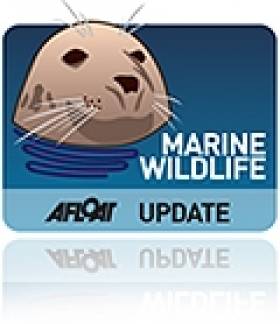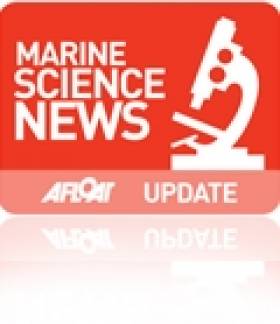Displaying items by tag: MarineLife
Marine Life Researchers Get Free Passage Across Irish Sea
#MARINE WILDLIFE - Seatruck Ferries is providing free passage this autumn for surveyors with a UK-based marine wildlife charity to discover how many dolphins and seabirds make their home in the Irish Sea.
MARINElife will be extending its marine conservation research on existing sailings operating between Liverpool and Dublin - and it is hoped its surveyors will spot a variety of cetaceans en route, including minke whales, common dolphin, Harbour Porpoise and Risso's dolphins.
Grey seals, basking sharks and a host of seabirds from the gannet to the Manx Shearwater, which winters off the coast of Brazil, may also be spotted.
The charity will be running monthly scientific surveys - the first started last week on 27th September – and its recorded sightings will be posted on the MARINElife website.
It's expected that the data collected will contribute to a better understanding of the distribution and abundance of dolphins, porpoises, seals and seabirds in the Irish Sea.
The research with Seatruck Ferries also contributes to a larger project operating on ferries around the UK coastline.
Kevin Gilland, Seatruck Ferries representative involved in the project, said: "We are delighted to expand our help to MARINElife so they can further develop the understanding of the wildlife in the area. We look forward to hearing more about the wildlife encountered on these routes."
Adrian Shephard, trustee for MARINElife, commented that "ferries, or ships of opportunity as we refer to them, are a very convenient way of carrying out off-shore surveys.
"They allow us to access the same areas of ocean and monitor for changes over time - vital information which forms the basis of conservation decisions."
MARINElife research director Dr Tom Brereton described the ferry routes across the Irish Sea as "particularly vital as the area is an important passage for whale, dolphins, sharks and even turtles."
Ferry Operator Assists in Marine-Life Conservation Role
Fastnet Line which runs the Cork-Swansea port route on the Celtic Sea, is assisting the charity MarineLife to monitor cetaceans, writes Jehan Ashmore.
The work of MarineLife is to survey the population trends and track the movements of dolphins, whales, porpoises and other wildlife. The research is undertaken onboard Fastnet Line's Julia (1981/21,699grt) and access to the ferry is provided free-of-charge to the wildlife-based charity.
During the months of July and August the ferry's schedule will allow for further opportunities to conduct daylight sightings of marine-life which is to be posted on MarineLife and Fastnet Line websites.
Adrian Shephard, Chairman of MarineLife Trustees, said: "The route from Swansea to Cork crosses a range of marine habitats and we hope it will generate many sightings of cetaceans and seabirds, including two important species we monitor, the white-beaked dolphin and the balearic shearwater".
In addition monitors recently observed fin whales, the second largest whale on the planet. Such sightings provide vital information and this will contribute to a better understanding of the distribution of cetaceans and other marine life in the Celtic Sea. To read more www.marine-life.org.uk
The first of four summertime surveys is to take place on 10 July. Overall the research by MarineLife is part of a larger project which also involves the use of other ferries operating in the Irish Sea and those serving on UK continental routes.
The 1,500 passenger / 325 car-carrying Julia sails year-round six times a week between September to June and from next month and during August the vessel will provide eight sailings per week. For fares and sailings schedules contact www.fastnetline.com

























































